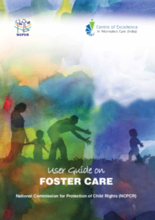childrens_living_arrangement
children_living_without_bio
Displaying 261 - 270 of 427
In this webinar, hosted by Rise Learning Network, Deep Savarni, Founder & Director of Praajak Development Society shares his experience in establishing the Child Protection Committees as a means to realize effective participation of children in monitoring care services in government-run child care institutions in India.
UNICEF is seeking a Child Protection Specialist in New Delhi, India.
UNICEF is seeking a Child Protection Specialist is New Delhi.
"India has suspended an American adoption agency for what the government says was 'negligent' behavior in the assessment of adoptive parents," according to this article and accompanying video from WFAA.
The Supreme Court of India has issued notices to all states and Union Territories in light of recent concerns regarding child trafficking in orphanages, according to this article from the New Indian Express.
An orphanage in Vanasthalipuram, India was "sealed" upon discovery that the children residing in the institution had been forced to beg on the streets, according to this article from the Times of India.
This study focuses on the preparation for social reintegration of young Indian girls about to leave their residential care homes.
The National Commission for the Protection of Child Rights (NCPCR) of India has formulated this Standard Operating Procedure (SOP) in order to address gaps in current policy regarding the death of a child in a Child Care Institution (CCI) and the duty of Child Care Institutions to address issues such as escape, runaway or sexual abuse of children in the CCI.
This volume is an effort to highlight best practices for children without parental care.
This User Guide aims to provide a comprehensive approach to the development of a good quality foster care service in India, which will be useful for a range of practitioners.



